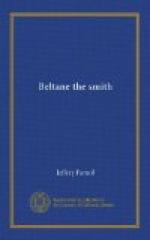“Bloody Pertolepe—is dead!” he cried, and choked; and choking—died.
CHAPTER LXX
WHICH SPEAKETH FOR ITSELF
It was not the piping of throstle or sweet-throated merle that had waked my Beltane, who with slumberous eyes stared up at carven canopy, round him upon rich arras, and down upon embroidered bed-covering and silken pillow, while through the narrow lattice the young sun played upon gilded roof-beam and polished floor. So lay Beltane, blinking sleepy eyes and hearkening to a soft and melodious whistling from the little garden below his casement.
Being thus heavy with sleep, he wondered drowsily what great content was this that filled him, and wherefore? Wondering yet, he sighed, and because of the sun’s radiance, closed slumberous eyes again and would have slept; but, of a sudden the whistling ceased, and a rich, sweet voice fell to gentle singing.
“Hark! in the whisper of the wind
Love calleth thee away,
Each leaf a small, soft voice doth
find,
Each pretty bird doth cry in kind,
O heart, haste north to-day.”
Beltane sat up broad awake, for Blaen lay to the north, and in Blaen— But Giles was singing on:
“Youth is quick to speed away,
But love abideth ever.
Fortune, though she smile to-day,
Fickle is and will not stay,
But true-love changeth never.
“The world doth change, as change
it must,
But true-love changeth never.
Proud ambition is but dust,
The bow doth break, the sword doth
rust,
But love abideth ever.”
Beltane was leaning half out of the casement, of the which fact who so unconscious as Giles, busily furbishing armour and bascinet.
“Giles!” he cried, “O Giles—rouse ye, man!”
“How, lord—art awake so early?” questioned Giles, looking up innocent of eye.
“Was it not for this thou didst sing, rogue Giles? Go now, bid Roger have three horses saddled, for within the hour we ride hence.”
“To Mortain, lord?” questioned Giles eagerly.
“Aye, Giles, to Mortain—north to Blaen; where else should we ride to-day?”
So saying, Beltane turned back into his sumptuous chamber and fell to donning, not his habiliments of state, but those well-worn garments, all frayed by his heavy mail. Swift dressed he and almost stealthily, oft pausing to glance into the empty garden below, and oft staying to listen to some sound within the massy building. And thus it was he started to hear a soft knocking at the door, and turning, beheld Sir Benedict.
“Forsooth, art up betimes, my lord Duke,” quoth he, bright eyes a-twinkle, “and verily I do commend this so great zeal in thee since there be many and divers matters do need thy ducal attention—matters of state and moment—”
“Matters of state?” saith Beltane, something troubled.




